The arrest of another journalist in China is normally cause for concern: as the news is shared across social networks, tweets of sympathy accumulate, human rights groups and lawyers protest, and diplomats may even issue statements of public concern.
But the detention of economics anchor Rui Chenggang (pictured), reportedly “dragged” from his offices by investigators just hours before his show was due to go live, has prompted almost the opposite – the overwhelming response, as the NY Times’s Ed Wong noted, has been one of schadenfreude (xingzai lehuo, “feel happy about someone’s disaster”). In a rare show of alliance, Western journalists and Chinese state media have instead issued a steady drip of allegations and gloating commentaries about Rui’s supposed misdeeds.
“It’s just breathtaking how many people feel disgusted or offended when he’s mentioned,” tweeted anti-censorship commentator Michael Anti while neatly skewering China’s own public-relations problem: “Such a classic example of negative PR, and yet Rui’s hailed as some icon of the nation’s soft power. There you have it, China’s rise.”
If a man is judged by the company he keeps, Rui was always keen to share his circle with the world. On his blogs, acquaintanceships with the likes of Bill Gates and Kevin Rudd were dropped with the frequency of one who has something to prove; his conversation is said to be similarly peppered with, “As Bill [Clinton] once told me…” or “As I said to Henry [Kissinger]…”
“[He’s] the biggest name-dropper I know,” said a former colleague at state mouthpiece CCTV, where he was a frequent presenter of Economics News Broadcast. Speaking on condition of anonymity, the colleague described her former peer in none-too-impressed terms: “Arrogant. Snobby. Climber.” And then there are his close relationships with many who have already fallen victim to the purge that is scything through Chinese society under the banner of a corruption crackdown (Rui is said to have boasted, for example, about his friendship with Bo Guagua, at least before the senior Bo was charged with corruption).
Still, none of this behavior qualifies as criminal – merely distasteful. Under the microscope, though, are apparent financial transgressions formerly considered de rigeur in Chinese media circles.
According to financial records reviewed last week by Tencent Finance, Rui helped set up a PR company called Pegasus and owned 30% of the firm. Pegasus later made the “Top 1o Chinese PR Firms” list compiled by the China International Public Relations Association and, since 2009, numbered among its clients — perhaps unsurprisingly — Rui’s employer, CCTV Finance Channel for its Davos coverage (cutting Rui loose on LinkedIn, the WEF’s managing director had this to say on the matter).
Edelman’s owners, via DJE vice-chairman Alan VanderMolen (who inked the purchase of Pegasus while running the firm’s Asia-Pacific operations), later confirmed to PR industry publication the Holmes Report that “Pegasus was engaged by corporate sponsors involved in underwriting CCTV’s presence” at Davos in 2009 and 2010. VanderMolen declined to identify the sponsors and added that there was no commercial relationship between CCTV and Pegasus “to my knowledge.”
Also taken away that fateful day was Li Yong, the Deputy Director of the Finance Channel, where Rui had worked since 2003, bringing the total of those at CCTV under investigation to nine – including its director Guo Zhenxi, producer Tian Liwu, and now its youngest presenter, the once-fragrant female anchor Ouyang Zhiwei.
Rui may have named his company Pegasus, the mythological wingéd horse, but a more apt classical analogy might be Icarus, the youthful highflier doomed by arrogance.
The well-connected 37-year-old presenter, who has been a regular at Davos World Economic Forum since he was 22, did not appear to envisage his own downfall, which was so sudden that his chair and microphone were still in place, awaiting him. In the event, the show aired at 20:30 on July 11, with his co-host taking on sole presenting duties.
Equally ignorant, apparently, were his colleagues: “We kept phoning him before the programme aired, but the calls never went through,” a CCTV staffer told Thepaper. “That’s why we didn’t even take down his mic.”
But his boss, Guo, had been detained on June 1 – a sure sign, at least, that trouble was imminent. Ever the showman, Rui batted off the rumors, issuing a denial through his assistant while taking to Weibo to quote a conversation between two ancient Zen masters (thus, of course, alluding to his own wisdom): “Hanshan asks Shide, ‘People libel me, bully me, insult me, trick me and neglect me. What should I do?’ Shide laughs: ‘Bear with them, avoid them, tolerate them, respect them and ignore them. Give it a few years, and let’s see.’”
In fact, Rui was only given a few weeks. Meanwhile, he was, at least, wise enough to hedge: his wife and child left for the US in June, according to elite gossip, and are not expected to return.
~
It should not be surprising that his career has almost certainly peaked at the comparatively early age of 36. Rui Chenggang was always an early developer. Born in 1977, he began learning English when he was 10, and according to his own claims, was reading English-language books, including Lady Chatterley’s Lover, by the time he reached middle school.
The top gaokao (university entrance exam) scorer in Hefei, his hometown, Rui entered the Foreign Affairs University in Beijing in 1995, where he had a chance to see the world through an international debate contest. He was, he says, shocked to find how Western youth were educated to express their opinions freely, and told Southern People Weekly he felt like an idiot
In 1999, Rui graduated and, turning down offers from the Ministry of Foreign Affairs and Bank of China, chose to work at an emerging arm of the state-owned CCTV: the English Channel.
A former colleague there, according to the same article, recalls a man “extremely good at the language [English] and quite smart. He… often said things like he ‘wanted to become the bridge of communication between the East and the West.’” Rui was also an avid self-promoter, says the colleague. When interviewing, he’d hand out copies of his book, urge them to watch his programmes and collect photographs of himself with foreign luminaries.
Four years after Rui began at CCTV English, he was talent-spotted by Finance Channel producer Wang Lifen to host Global News Bulletin, a new current-affairs show. He quickly made a name for himself, scrutinizing the scripts and frequently digressing from them, a practice all but unheard-of among Chinese anchors. A pattern in his work behavior began to emerge: superiors such as producer Qian Xi, who has worked with Rui since 2003, called him “the symbol of the Finance Channel’s internationalization,” even while colleagues and underlings recalled an aloof, distant figure.
“He gets close to the leaders, but stays very distant from common coworkers, barely even saying ‘hello’ to them,” said one peer, who asked not to be named because he still works for the channel.
With a 200- to 300-million-strong audience, Rui’s domestic admiration mostly stemmed from public associating himself with world elites at Davos in 2008; he enjoyed almost rock-star status among younger viewers. But Rui’s link to Davos wasn’t limited to a role in front of the cameras. By then, Pegasus – the firm he still held a 36% share of – had become the executive service provider for CCTV, reportedly finding a studio for the station a mere 200 metres from the main venue in Switzerland. Tony Blair (pictured) apparently called it “the most cozy and comfortable studio in all of Davos,” according to Tencent. Rui reportedly only sold his Pegasus shares in 2010.
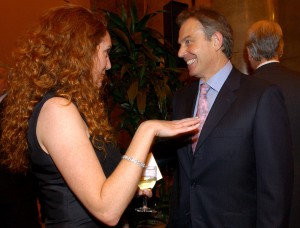
British ex-PM Tony Blair with former News of the World editor Rebekah Brooks, recently acquitted of phone hacking
Sources in CCTV also told thepaper.cn that Rui’s family set up their own PR firm, with the sole purpose of commercializing Rui’s interview subjects, their schedules and campaign content. Certainly, he is believed to enjoy a close personal friendship with politician Ling Jinhua’s family that has been subject to longstanding rumors.
Such conflicts of interest appear at odds with his role as a journalist, at least in foreign eyes – but then Chinese media is saturated with such misbehavior. Is it against the law? Even the Global Times wondered. “Did [Rui] know that such behavior was illegal?” asked an unsigned editorial on Tuesday. “Perhaps he believed he was in a gray area where some seek personal gains by exploiting their positions. But the anti-corruption campaign not only targets ‘black holes,’ but also gray areas.”
~
Advertising and public relations (gonggong guanxi) is one of the murkiest industries in China (and also, to be fair, elsewhere). The word guanxi implies connections, the ability to enjoy a string-pulling reach that bests rivals: How many journalists and celebrities can you guarantee at a product launch? Which newspapers can be bought off to stay quiet about a scandal?
Ding Shumiao, for instance, the Shanxi businesswoman accused of colluding with the disgraced railways chief Liu Zhijun over projects worth 180 billion yuan (HK$226 billion), reportedly collected nearly 4 billion yuan securing contracts for the high-speed network with Liu’s help. Her company, founded in 2008, became practically the exclusive advertisement agency for high-speed rail, reaped 120 million RMB in 2010 alone from state-owned companies attending the seventh World Congress on High Speed Rail in Beijing, all thanks to Liu.
One of the Finance Channel’s trademark shows, the annual Consumer Rights Gala on March 15, had become another income source for Guo and his gang. Notorious for its toothless exposes of “scandals” usually perpetuated by foreign firms – while ignoring the egregious antics of domestic giants – the show has been widely mocked in recent years for its clumsy nationalism and reporting techniques.
According to Caixin, local governments and companies routinely inquire before annual tapings to see if their products were on the CCTV “blacklist,” and then offer to pay a gagging fee. Other programmes, such as the praise-singing Economic Figures of the Year, are essentially paid services available to the highest bidder. One website operator told Caixin that Guo had often used his influence to ask portals to delete critical posts about companies that had approached him, or other presenters familiar with him, for help (a practice known in China as “black” PR).
The downfall of Rui and his mentor, Guo, can be seen as part of the aftermath of Li Dongsheng’s arrest and, behind that, ex-Politburo security czar Zhou Yongkang’s own (still unofficial) downfall. Li had worked at CCTV for 21 years, since 1978, and eventually became the vice chief of the state channel. He took off quickly from there and moved on to state censors, the then-SARFT, and the Ministry of Propaganda.
It was in 2007, says Caixin (in an article already deleted), that Li hoped to join the Central Standing Committee of the Communist Party, but was hindered by his rivals, who tipped off ministers that his daughter was studying in the UK thanks to illicit “sponsorship” and his brother, who was running an advertising agency, was also benefiting from his positions.
Li’s trouble, however, was “handled, thanks to a senior leader’s help,” according to a source of Caixin. This “senior leader” is now believed to be none other than Zhou Yongkang, once henchman-in-chief of China’s sprawling security apparatus, and whose power network has been steadily eroded since retirement via a series of arrests and investigations (Zhou himself has not been seen in public since December).
The source, however, could not confirm how close exactly the two were, nor the validity of the rumor that Li introduced Jia Xiaoye, the then-CCTV Finance Channel producer, to Zhou, 28 years her senior; the pair later married.
On June 14, just three days after the capture of Rui Chenggang, Li was announced together with Jiang Jiemin and Wang Yongchun, two former chiefs from the CNPC, as being formally investigated. Both had worked for many years with Zhou.
~
While at Yale for a year in 2005 – he is still a World Fellow – Rui was remembered as a self-styled fenqing (“angry youth”), promoting and defending the motherland on a personal mission, whenever he heard “anti-China” voices. He took one law professor to task for calling China “not a democratic country”; Rui argued “Americans always think there’s only one type of democracy, which is the American kind. But democracy has different meanings and different stages.”
On his popular blog, a large part of which is devoted to conversations and photos with his star-studded Rolodex, Rui’s best-known piece is still the one published in 2007, calling for Starbucks to be ejected from the Forbidden City. (That didn’t prevent Rui from having his cake while eating it, boasting of email exchanges with Jim Donald, the coffee chain’s new CEO, as if the pair were close friends.)
Indeed, according to one guest who shared a banqueting table with Rui, the host frequently referred to former US President Bill Clinton as “a very good friend of mine.” Like most of his associates, which once included Kevin Rudd, George W. Bush and Warren Buffet, Clinton seems unlikely to come to the defense of his “friend” in his hour of need.
Question marks even surround the true extent of Rui’s wealth. The TV star, who purportedly enjoys an official salary of around 150,000 RMB a year, is known for his cost-cutting ways. At the aforementioned banquet, a well-lubricated Rui is said to have finished two bottles of wine before a Sinopec executive at the table that he could polish off a third. The stake Rui demanded? A Sinopec card, so he could fill up for free in perpetuity.
If that seems grasping for someone who famously drives a foreign-made Jaguar, it may be worth noting that surface is very often illusory, especially in China. One user of Zhihu – a kind of Chinese Quora – claims his client was constantly being hassled to lend his car, a Land Rover, to a wealthy neighbor: one Rui Chenggan.
And perhaps due to his domestic celebrity, Rui sometimes over-estimated his influence abroad. A hotel management student at the University of Nevada recalled that, when Rui stayed at the Las Vegas hotel where she was interning, he made an indecent proposal. When she declined Rui’s offer, the host allegedly became incensed at what he inferred as the suggestion he couldn’t afford the asking price.
According to a PR manager for Emirates Airline, Rui purchased an economy-class ticket to visit Brazil but demanded a free upgrade to first class. Unsurprisingly, he was rejected, but took his grievance to Weibo (writing that “Emirates’s A380 feels really so-so. Although the plane is a bit bigger and looks new, there’s no enhancement to comfort and the space division makes one feel suppressed… Emirates’ trademark fake-mahogany interior feels like only faux luxury”).
Li Yong, the deputy director also arrested, never even made it to Brazil: he was reportedly stopped at customs en route to report on the BRICS summit, though it’s not clear what exactly for. The local rumor mill suggests his arrest may actually be unrelated to Guo’s; the two are said to dislike one another.
“All the world’s a stage, and all the men and women merely players” was one of several Shakespeare quotations Rui was fond of tossing into speeches. (In his autobiography, Rui professes to be able to recite entire sections of Shakespeare, Francis Bacon and Bertrand Russell). Alas, it seems that Rui has now exited the stage, apparently pursued by a bear even he can’t tame.
Follow Valentina @valentinaluo (H/T RFH)

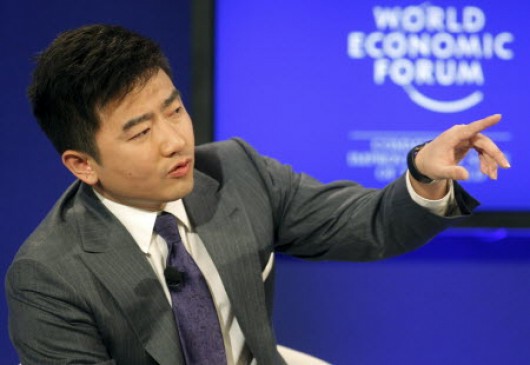

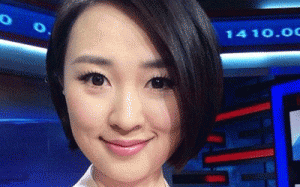
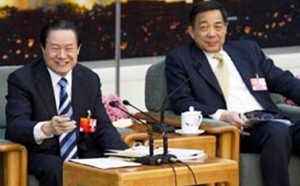
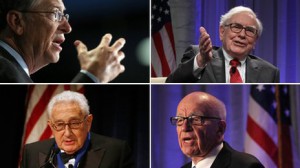
















































Sorry to sound like a spam-bot, but I really do have little more to add than “this was a great piece”.
Oh, and can I be the only one who hopes that Yang Rui will end up going the same way as Rui Chenggang?
You forgot to add “prattling xenophobe” before “Yang Rui”. Actually, his full title is “Prattling xenophobe and Party Ball-Sucker Yang Rui”.
Thanks for a remarkable post, which is actually as good as any article I’d expect to see in the NY Times Sunday Magazine. Great work.
My thanks to the author for a very well-written article.
To agree with the other comments, I hope CCTV’s Yang Rui, a pompous little lickspittle, has the same ending as Rui Chenggang.
Ditto above sentiments. As I’ve already wished a little extra-judicial torture on this odious creature on another site last week, can only add that there would be complete and universal justice in this world if Class A war criminal Kissinger, psychopath Rudd, loony Blair and the rest of the corporate vermin joined Rui in the House of Doors.
Anyway, it is sort of nice to know that he will probably experience the joys of non-consensual sex during the weekly shower muster.
Hi there, yeah this post is actually nice and I have learned lot of things from it
about blogging. thanks.